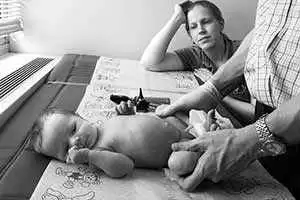Celiac.com 01/14/2013 - Sweden has seen a sharp rise in cases of celiac disease in children under two years of age. A research team recently studied the possible connection between early infections and celiac disease, along with their possible role in the explosion of celiac cases in Swedish children.
The research team included Anna Myléus, Olle Hernell, Leif Gothefors, Marie-Louise Hammarström, Lars-Åke Persson, Hans Stenlund and Anneli Ivarsson.
Celiac.com Sponsor (A12):
 They are affiliated with the Epidemiology and Global Health, Department of Public Health and Clinical Medicine at Umeå University, Pediatrics unit of the Department of Clinical Sciences at Umeå University, the Immunology unit of the Department of Clinical Microbiology at Umeå University in Umeå, Sweden, and with the International Maternal and Child Health, Department of Women's and Children's Health in Uppsala University in Uppsala, Sweden.
They are affiliated with the Epidemiology and Global Health, Department of Public Health and Clinical Medicine at Umeå University, Pediatrics unit of the Department of Clinical Sciences at Umeå University, the Immunology unit of the Department of Clinical Microbiology at Umeå University in Umeå, Sweden, and with the International Maternal and Child Health, Department of Women's and Children's Health in Uppsala University in Uppsala, Sweden.
The team used a questionnaire to carry out a population-based incident case-referent study. The questionnaire went out to 475 cases and 950 referents, and included questions on family characteristics, infant feeding, and the child's general health.
All cases of celiac disease cases were diagnosed before two years of age, and fulfilled the diagnostic criteria of the European Society for Pediatric Gastroenterology, Hepatology and Nutrition.
The team randomly selected referents, matched by criteria, from the national population register.
The final analysis included 373 (79%) cases of confirmed celiac disease and 581 (61%) referents, for a total of 954 children.
For each case of celiac disease, the team matched complete information on main variables of interest with one or two referents.
The results showed that children who suffered three or more parental-reported infectious episodes, regardless of type of infection, during the first six months of life faced a significantly higher risk for later celiac disease..
This risk remained after the team adjusted for infant feeding and socioeconomic status (odds ratio [OR] 1.5; 95% confidence interval [CI], 1.1-2.0; P=0.014).
Infants who had several infectious episodes, and whose parents introduced dietary gluten in large amounts, compared to small or medium amounts, after breastfeeding was discontinued faced an even greater risk (OR 5.6; 95% CI, 3.1-10; P<0.001).
This study suggests that children who suffer repeated infections before age two face an increased risk for developing celiac disease later on. The risk was even greater in children who suffered repeated infections and whose parents introduced gluten in large quantities after weening.
The team concludes that early infections probably made a minor contribution to the rise in celiac disease cases in Swedish children relative to the amounts of gluten introduced into the children's diets after weening.
Source:
- Open Original Shared Link




Recommended Comments